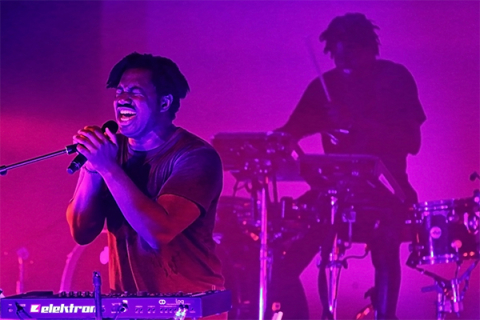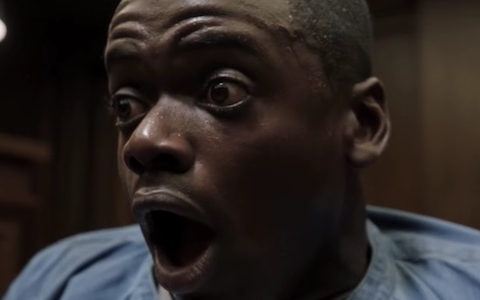
Warren Fu has directed some of the music industry’s biggest names, for example he’s a frequent collaborator with Daft Punk. He casually mentions in conversation that he “spoke to Julian from The Strokes the other day” like it’s no big deal. They’re mates, so it isn’t a big deal—to him anyway. With a career that started out working in pre-production (like the early 2000’s Star Wars prequels and 2009’s Star Trek) Warren is able to apply his creative mind to all stages of video development. Although that sometimes leads to him finishing storyboards in his car outside a shoot, minutes before he’s meant to film it. At the moment Warren’s in Australia as a part of Clipped Music Video Festival so we caught him while he was here.
What do you think makes a good music video?
Well I think that’s what makes music videos great—there aren’t really any rules to them. It’s really one of these art forms where people can just push it in any direction and it can be good in many different ways. There are videos that are just aesthetically beautiful, that marry with the music in a very harmonious way. And then there are more subversive ones, for example Eric Wareheim did a Beach House video—it was a brilliant video but I can’t imagine it being what the band had in mind. I would love to figure out how that was made because the Beach House people seem so serious.
Some of my favourites are all over the map. They all just kind of need that hook, that thing that’s in its DNA that makes it compelling and powerful. One of my favaourites is Michel Gondry’s ‘Around The World’, just how he personified music. There’s no story—it’s the sonics represented by different characters and that’s what makes it brilliant. There can be political music videos like MIA does that are powerful in that way. And some can just be like a Snoop or Dre video, which just makes you feel badass.
When someone like Michel Gondry, a theatrical filmmaker, comes along and does a music video are you kind of like, “fuck you man”?
I really like it when there’s good ones. I won’t say names but I’ve seen some big directors that have done music videos that haven’t really worked. Especially in today’s climate of reduced budgets, big feature directors don’t have the resources that they once had. Music videos are very scrappy, DIY, hands-on kind of thing. Even the bigger budget ones now—you’d be surprised how fast the money runs out.
Budgets have reduced? I thought since there’s a move towards more video content online that music videos would be more important than ever?
There is more diversity in what you can do now. Especially since the days of MTV where you had to have four minutes for a song, now there’s definitely no limit to what you can do. You can have stuff like ‘Lemonade’. As far as censorship too, now you can have swearing and nudity and get away with that on the internet. You can do short films that are branded content with an artist that aren’t necessarily music videos. There’s more brand partnerships for better or worse. But now that audiences kind of understand that it’s kind of accepted. In the ‘90s and 2000s if you did that everyone was like, “sell out, sell out, sell out.” Now it’s more important to find a way to do things tastefully.
One of my favourite things is really clunky product placement in rap videos. I love it.
The Beats by Dre headphones. [Laughs] it’s pretty funny. There’s a certain vibe of embracing it and making the tone of the video fit the product placement. Apple Music has been doing a cool job of funding stuff and they don’t usually require any branding except a little tag at the end or it’s exclusive to their site for a while. ‘Hotline Bling’ was one of those; people say that it lost a bit of its impact because it was behind a paywall. But I think if it’s a big enough artist and a good enough song it doesn’t matter. People are still going to want to see it.
Is that exciting for you as a filmmaker to have those new avenues?
I think it is. There really are no constraints.
Something like ‘Lemonade’ is probably one of the biggest examples of completely messing with convention and proving it can be successful. That would have made it easier for others to push boundaries now.
Exactly.
When you work on a video is it just you and the artist? Or is there a third person like the label involved?
Mostly I work with the artist. The majority of the artists that I gravitate towards, or who tend to gravitate towards me, are ones who have a distinct point of view. I’ve heard some filmmakers say on their projects the label has come in and tried to shape what they do—but I have not had that experience. I’ve actually seen some situations where the label is scared to say something so they’ll ask me to say something to the artist.
Do you have that sometimes yourself? Where you don’t want to ask an artist something?
I’m pretty good at bringing up when something’s not a good idea. Usually I’ll make my case and if they’re still not convinced, at the end of the day, it’s their song and their representation of it. I’m not going to be the type to be like “screw you” and leave the set. But I’ll still always voice my opinion if I think something’s not right.
What’s the average production time on one of your videos?
It can take one or two months depending on the size of the production. Something as big as ‘Instant Crush’ was two months including post-production. Especially something like that where we had actual pyrotechnics, we had R&D for melting wax figures, and a lot production design. It was almost like a mini movie in a way.
How long did that clip end up being?
It’s five minutes.
That’s two months of work for five minutes of video.
It was fun because the whole theme of that Daft Punk album was analogue, right down to the album cover, which I worked with them on. They insisted that the copy that I wrote—Random Access Memory that’s my handwriting on the cover—they insisted I not do it digitally. They had me go to the office and show them all the reams of paper and the different attempts. I still have that box of paper. They were very insistent on that album recapturing a tactile feeling in music that they thought was lost. When it came to the video we shot on 35mm and there were no digital effects. As a kid who grew up watching ‘Thriller’ it really felt like I was working in that era of filmmaking.
That point in the mid to late ‘80s where analogue starts meeting digital seems to a consistent aesthetic in your work.
When TV went to HD I remember thinking, “This is too sharp. I don’t want to see everybody’s zits.” There’s something romantic about the mushiness of pre-digital. I guess film is more painterly too me. It’s an interpretation of reality that gets to be beautiful. I haven’t seen the new Twin Peaks yet but I was talking to Julian from The Strokes the other day and he was like, “I really wish somebody told David Lynch to find the old cameras he used on the old Twin Peaks.” He said, “There’s something so HD about it.” The thing is, the stuff that I like to create is to transport in to another time, realm, or reality and I think not working with HD helps you move the audience in to that place.
You’re in Australia at the moment for Clipped, what are you doing there?
I’m going to be a judge in the film competition. I’m looking forward to being a viewer, seeing other people’s work and enjoying it. And getting to speak with other filmmakers is always nice. Talking to other directors is good because it’s such an isolating thing to be on set by yourself.
Clipped Music Video Festival is running this Saturday. You can see the program here and buy tickets here.



